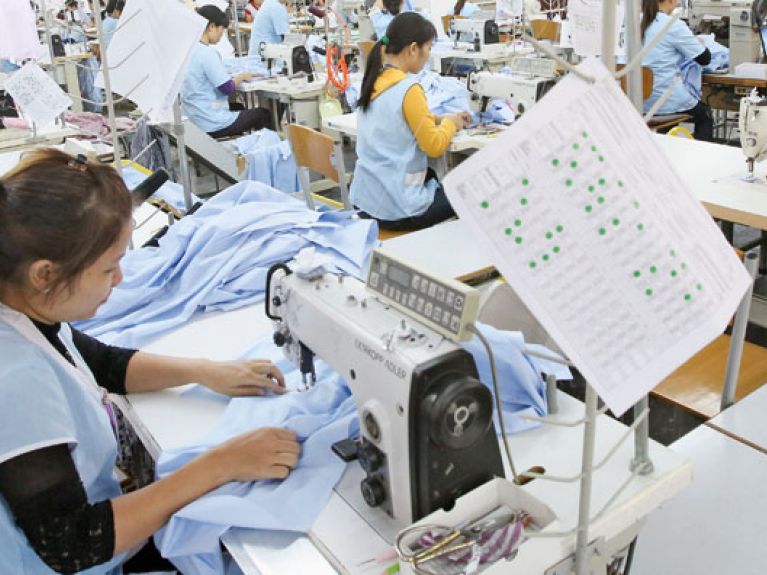Sustainable trade makes an impact
Germany is taking its international responsibility seriously in various areas. The focus in Asia is on social and environmental standards.

The collapse of the eight-story Rana Plaza in Bangladesh in 2013, in which several textile companies were operating, cast a shadow over manufacturing conditions in Asia and marked a turning point in the global debate over social and environmental conditions. German industry was quick to respond after the disaster. In 2014, the Federal Minister for Economic Cooperation and Development, Gerd Müller, invited representatives from politics, the private sector and civil society to form the Partnership for Sustainable Textiles. Its goal is to improve working and environmental conditions in manufacturing countries, in particular in Asia. There are approximately 5,500 textile factories in Bangladesh, more than 700 of which have now adopted this approach. The German Agency for International Cooperation (GIZ) is expecting that the initiative will give a further push in the direction of sustainability. The Partnership brings unions and non-governmental organisations (NGOs) from the development and environmental sector together with the Development Ministry, and nearly half of German textile companies have now joined. They have drafted a Plan of Action in which they undertake not only to improve the social, ecological and economic conditions along the entire supply chain, but also to observe minimum standards.
What is special about this is that for the first time major representatives of various interest groups are coming together in one place. Major clothing companies such as adidas, Gerry Weber and C&A are involved, along with the German Retail Federation (HDE), the German Confederation of Trade Unions (DGB) and the standards organisation GOTS (Global Organic Textile Standard). Specific measures to improve production conditions are developed by working groups – for example, with regard to processing chemicals and natural fibres or payment of a living wage. A list of chemical substances that are hazardous and therefore to be avoided has already been agreed. “The Partnership for Sustainable Textiles does not work on short-term projects. Rather, it is concerned with long-term and systemic changes in the industry,” emphasises press relations officer Andrea Burkhardt. Specialised working groups review whether textile labels already in existence such as BCI (Better Cotton Initiative) or GOTS comply with the objectives of the Plan of Action in relation, for example, to child labour, avoidance of hazardous chemicals or occupational safety. If so, they are recognised as Partnership standards and provide consumers with reliable guidance.
Certification is also an important instrument in the protection of tropical forests. The Forum for Sustainable Palm Oil (FONAP) is based in Bonn and has about 40 members. There are many SMEs represented as well as groups from the consumer products industry, and they have been using only certified sustainable palm oil in their products since late 2014. “This sends a clear signal to producers,” observes project manager Daniel May. The aim of the Forum is to boost significantly the proportion of certified palm oil, palm kernel oil and derivatives from palm kernel oil on the German, Austrian and Swiss markets. Palm oil is used in the production of many foodstuffs and also in the cosmetics industry. About 90% of global production comes from Indonesia and Malaysia. Data from NASA shows that certified plantations are affected much less frequently by slash-and-burn farming than non-certified. Sustainable management and avoiding the use of pesticides have just as positive an effect on biodiversity and environmental protection as they do on yields. Thus in Thailand smallholders of certified plantations were given training in sustainable methods of cultivation – and increased their incomes by 25%. The next important steps will be to improve the transparency and controllability of the certificates and, working with the Roundtable on Sustainable Palm Oil (RSPO) and the signatories of the Indonesian Palm Oil Pledge (IPOP), define uniform standards and agree on a control mechanism.
BASF, the world’s largest chemical producer, made a commitment to sustainability early on. The company became involved in implementing the Millennium Goals in Bangladesh as early as 2009 and, together with Nobel Prize winner Mohammad Yunus, formed the company BASF Grameen for healthcare. BASF is currently pressing ahead with various projects in India which are intended to facilitate access to safe drinking water. Scarcity of water is a cause for concern in several states: almost one fifth of the world’s population lives in India, but the country only has access to 4% of the world’s fresh water resources. In cooperation with WaterLife India, BASF has constructed a plant in Chennai to treat and distribute drinking water with a daily capacity of 24,000 litres. The partnership is guaranteed for the next ten years. In Mangalore, new sanitary facilities were installed for 2,000 school children, and both there and in Chennai, BASF is also emphasising an accompanying education programme, which is intended to strengthen personal skills with regard to water, sanitation and hygiene (WASH). The goal is to raise awareness of the issue using clear methods and to demonstrate how one’s own health can be better protected.
A further major challenge for the future is apparent even today in Bangladesh, a country where climate change is having major effects. Rainfall causes rivers to burst their banks and destroy land cultivated by farmers. Storm tides on the coast not only lead to devastation but also cause arable land to become salinated and thus unproductive. Deprived of their livelihood, many people make their way to the cities. GIZ, acting on behalf of the Federal Ministry for Economic Cooperation and Development (BMZ), is using the Special Initiative “Tackling the root causes of displacement, reintegrating refugees” to help put host communities in a position where they can offer their residents new prospects. In north-west Rajshahi, for example, there are training programmes in silk production which is a major sector of the economy. In Khulna there is training in the fishing industry and supplier industries for shipbuilding, which should help people generate an income – and encourage them to stay.

